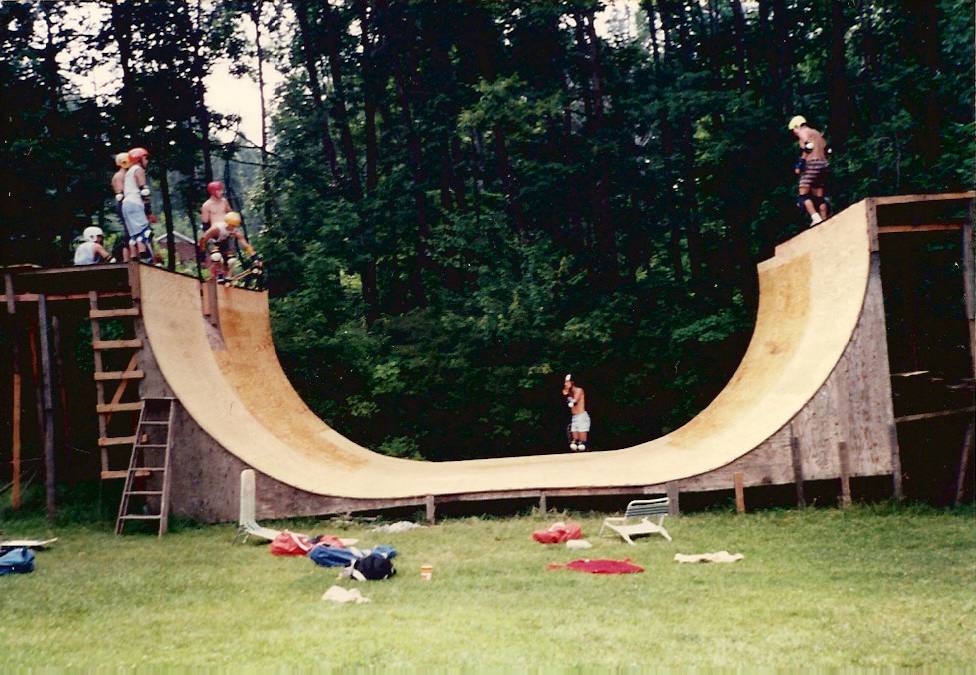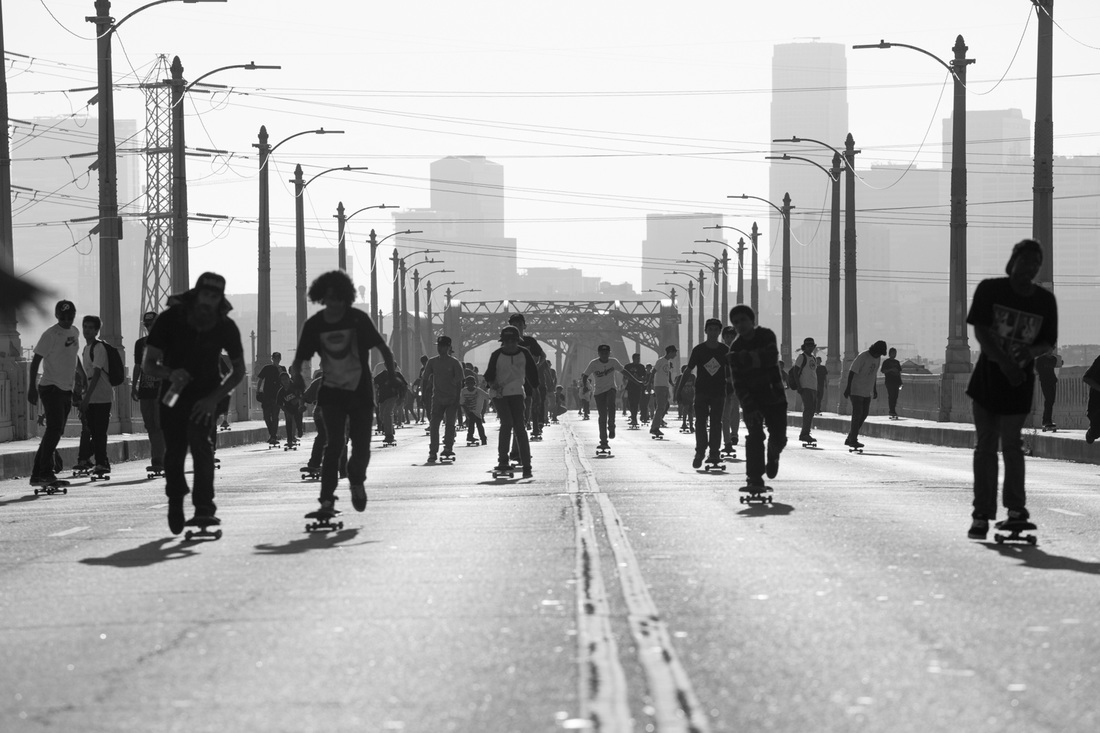In the beginning, skateboarding was born as a complement to surfing. Surfers, most commonly in Southern California, took to the streets with makeshift skateboards to emulate the feeling of surfing when the waves were flat or blowing out. Times have gradually, yet drastically, changed.
Skateboarding grew to become an act of rebellion and a stronger component of the surf/skate lifestyle. The subculture that eventually became iconic was the surfer/skater that played punk rock music and was sexually active among his peers. The surfer/skater/punker. Later on in the timeline of skateboarding, it became a more separate activity with its own personalities, communities, and unspoken “rules of cool." Throughout the late eighties into the early nineties, skateboarding devolved into a sport for derelicts. Popularity declined quickly and without much warning. Only those with the most loyal interest in skating were doing it. It was not popular, skateparks had closed down en masse, and skateboarding only existed on backyard ramps amongst other purists of skateboarding.
Skateboarding grew to become an act of rebellion and a stronger component of the surf/skate lifestyle. The subculture that eventually became iconic was the surfer/skater that played punk rock music and was sexually active among his peers. The surfer/skater/punker. Later on in the timeline of skateboarding, it became a more separate activity with its own personalities, communities, and unspoken “rules of cool." Throughout the late eighties into the early nineties, skateboarding devolved into a sport for derelicts. Popularity declined quickly and without much warning. Only those with the most loyal interest in skating were doing it. It was not popular, skateparks had closed down en masse, and skateboarding only existed on backyard ramps amongst other purists of skateboarding.
As the mid-nineties came into the picture, so did street skating, which offered a fresh take on skateboarding and a new view on what could be done on that piece of wood. A new culture within skating started to emerge. One that differed from that of the former ramp skaters. For the first time, there was a major schism within skateboarding, separating some skaters from others and ultimately taking power away from skateboarding as a whole and as one complete family.
As skateboarding approached the new millennium, real money was coming back into the “sport,” attracting and growing brands, new and old, to the world of skateboarding. This brought an unspoken “status” to certain skaters that were in the limelight of that time and therein brought new “rules of cool” to skateboarding. This trend continued through the 00’s, and skateboarders became actually cool. The cool was back in the “sport.” The public started to observe skaters that were making good money as professionals, and the perception of what it meant to be a pro skater changed dramatically.
Now, more than ever, there is a purist attitude that creates a separation between those that wish they were in the early nineties, when skateboarding wasn’t done to be cool, and those that are in skateboarding because others are too and it’s a “cool” thing to do. The list of unspoken rules has become longer and longer, and to be cool within the “core” community of skateboarders, it's become a requirement to act a certain way, wear a certain type of clothing, do certain types of tricks, etc.
Of course, to truly shine as a professional, you could and should do something totally different from what anyone else is. But to fit in within the local communities, there is usually a pressure to act as skaters think they should act. Over decades, skateboarding now has withstood multiple generations and has changed astoundingly. What was once so inclusive is now so exclusive amongst so many cliques in the growing global network of skateboarders.
As skateboarding approached the new millennium, real money was coming back into the “sport,” attracting and growing brands, new and old, to the world of skateboarding. This brought an unspoken “status” to certain skaters that were in the limelight of that time and therein brought new “rules of cool” to skateboarding. This trend continued through the 00’s, and skateboarders became actually cool. The cool was back in the “sport.” The public started to observe skaters that were making good money as professionals, and the perception of what it meant to be a pro skater changed dramatically.
Now, more than ever, there is a purist attitude that creates a separation between those that wish they were in the early nineties, when skateboarding wasn’t done to be cool, and those that are in skateboarding because others are too and it’s a “cool” thing to do. The list of unspoken rules has become longer and longer, and to be cool within the “core” community of skateboarders, it's become a requirement to act a certain way, wear a certain type of clothing, do certain types of tricks, etc.
Of course, to truly shine as a professional, you could and should do something totally different from what anyone else is. But to fit in within the local communities, there is usually a pressure to act as skaters think they should act. Over decades, skateboarding now has withstood multiple generations and has changed astoundingly. What was once so inclusive is now so exclusive amongst so many cliques in the growing global network of skateboarders.
Skateboarders originally rooted from the surfers whom naturally rebelled against the “jocks” and “squares” of our society as we see it. But now, we are just as exclusive and overly proud of our own culture as the football players and alpha males that we grew up disliking. This is a generalization and may seem pessimistic, but many skaters are now obsessed with fashion trends, unaccepting of females in the community of actual skateboarders, and overly focused on personal (or crews’) successes amid the progression of skateboarding at large.
All groups of people practice ignorance to a certain level. Skaters have changed in their thoughts and habits, because the industry has made available the thoughts of promising careers, worldwide travel, and a possible career after skating talent eventually fades away. None of those things were fleeting thoughts in the minds of skaters of the 80’s or 90’s. They may have been dreams, but not rational ideas. This is not to say that a lucrative pro career as a skateboarder is impossible. There are some. But only some - the most elite of the elite.
Because of these new opportunities in skateboarding, the mass appeal has brought in the fair-weather fans and part-time enthusiasts. There’s nothing wrong with a part-time hobby; however, those that act as chameleons to the lifetime lovers of skating tend to be frowned upon. Everyone can skate, but not everyone does. That’s why it was so inclusive in the beginning. But when everyone skates, it’s hard to tell the troopers from the party poopers.
All groups of people practice ignorance to a certain level. Skaters have changed in their thoughts and habits, because the industry has made available the thoughts of promising careers, worldwide travel, and a possible career after skating talent eventually fades away. None of those things were fleeting thoughts in the minds of skaters of the 80’s or 90’s. They may have been dreams, but not rational ideas. This is not to say that a lucrative pro career as a skateboarder is impossible. There are some. But only some - the most elite of the elite.
Because of these new opportunities in skateboarding, the mass appeal has brought in the fair-weather fans and part-time enthusiasts. There’s nothing wrong with a part-time hobby; however, those that act as chameleons to the lifetime lovers of skating tend to be frowned upon. Everyone can skate, but not everyone does. That’s why it was so inclusive in the beginning. But when everyone skates, it’s hard to tell the troopers from the party poopers.
This is not to mention the scooters at the skatepark and other various byproducts of skateboarding’s footprint on our world’s culture. There are several other side-effects of skateboarding taking the world stage, for better and for worse.
At the end of the day, skaters, skate companies, and top influencers need to remember that skateboarding as a whole can influence our culture however we want to. We just need to come together.
As as a series of smaller groups with different opinions, we express our individuality as skateboarders. That is something we must never let go of. But when we come together to find common opinions and interests as skateboarders, the army of “skateboarding” can influence others in the best way possible.
Next time you see a skater knocking that guy’s style, don’t encourage it. Everyone has their own flavor, and that’s why skateboarding is rad. Manual technicians, downhill sliders, rail chompers, and park rats alike. We all ride the wooden toy. We’re all skateboarders.
It’s cool to be cool, but it’s cooler to be homies.
- 7Ply Epic
At the end of the day, skaters, skate companies, and top influencers need to remember that skateboarding as a whole can influence our culture however we want to. We just need to come together.
As as a series of smaller groups with different opinions, we express our individuality as skateboarders. That is something we must never let go of. But when we come together to find common opinions and interests as skateboarders, the army of “skateboarding” can influence others in the best way possible.
Next time you see a skater knocking that guy’s style, don’t encourage it. Everyone has their own flavor, and that’s why skateboarding is rad. Manual technicians, downhill sliders, rail chompers, and park rats alike. We all ride the wooden toy. We’re all skateboarders.
It’s cool to be cool, but it’s cooler to be homies.
- 7Ply Epic



 RSS Feed
RSS Feed